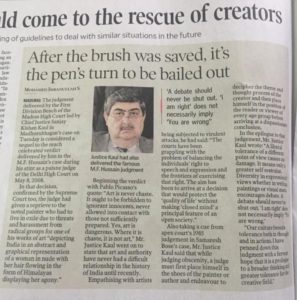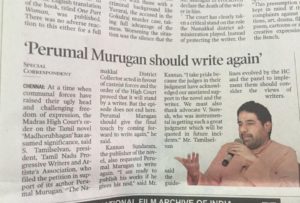Freedom of Expression: Perumal Murugan, 5 July 2016
 On 5 July 2016 a landmark judgment was passed by the Madras High Court quashing the criminal case against Tamil writer Perumal Muruganor for allegedly offending religious sentiments with his writings on caste. According to Scroll (http://bit.ly/29hWGdC) :
On 5 July 2016 a landmark judgment was passed by the Madras High Court quashing the criminal case against Tamil writer Perumal Muruganor for allegedly offending religious sentiments with his writings on caste. According to Scroll (http://bit.ly/29hWGdC) :
The author, who is known for his sharp commentary on caste, was  facing an onslaught from religious and caste groups who said he had hurt their sentiments.
facing an onslaught from religious and caste groups who said he had hurt their sentiments.
The Madras High Court on Tuesday quashed a criminal case against Tamil writer Perumal Murugan. …They also dismissed a plea moved by residents of his native town, Thiruchengode, to initiate criminal  proceedings against him.
proceedings against him.
The case was filed shortly after Murugan published Mathorubagan, a story about a childless couple in rural Tamil Nadu being pushed by their families to fall back on an ancient chariot festival in the temple of the half-female god Ardhanareeswara. Here, on the night of the festival, the union between any man and woman is permitted.
The book, which was translated into English as One Part Woman, published by Penguin India.
In response, the local administration organised a peace meet presided over by a district revenue official, where he had to agree to withdraw all copies of his book. However, on Tuesday, the Bench of Chief Justice SK Kaul and Justice Puspha Sathyanarayana held that the settlement arrived at during the peace-keeping meet would not be binding on the author.
Shortly after this meeting with the district authorities, Murugan announced on Facebook would stop writing. “Author Perumal Murugan is dead. He is no God. Hence, he will not resurrect. Hereafter, only P Murugan, a teacher, will live,” he had posted.
His books were then quietly removed from bookshops. Only the English translations of two of his more recent books – Pyre (published in Tamil as Pookkuzhi in 2013) and One Part Woman – are available. Two older books, Current Show and Seasons Of The Palm, are out of print and almost impossible to find. His Tamil books are entirely unavailable.
 An excerpt from the Madras high court judgement on Perumal Murugan :
An excerpt from the Madras high court judgement on Perumal Murugan :
The author Prof. Perumal Murugan should not be under fear. He should be able to write and advance the canvass of his writings. His writings would be a literary contribution, even if there were others who may differ with the material and style of his expression. The answer cannot be that it was his own decision to call himself dead as a writer. It was not a free decision, but a result of a situation which was created. …..”
“Let the author be resurrected for what he is best at, to write”.
Here is the complete judgment:
http://www.thehindu.com/multimedia/archive/02921/Perumal_Murugan_ca_2921087a.pdf
English translation of the new statement issued by Perumal Murugan, posted on Facebook by Kannan Sundaram, Publisher, Kalachuvadu Publications ( 6 July 2016). This statement has been translated by Aniruddhan Vasudevan and the poem by Perundevi Srinivasan:
The judgment gives me much happiness. It comforts a heart that was in a fuming withdrawal. I am trying to prop myself up holding on to the light of the last lines of the judgment: “Let the author be resurrected to what he is best at. Write.” I will get up. It is just that my mind wishes to spend a little time in the joy of this moment. My thanks to friends who stood by me. My thanks also to friends who stood against me.
The Flower
A flower blooms
after the big bang
Sharp fragrance
Sweet countenance
Shining Splendor
The flower would
take up and establish
everything.
6 July 2016
